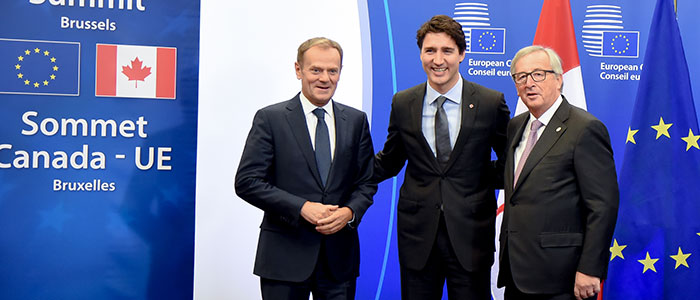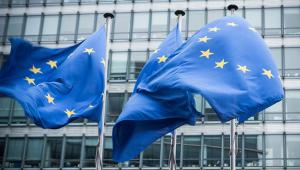CETA signing.jpg

European Council president Donald Tusk, Canadian prime minister Justin Trudeau and European Commission president Jean-Claude Juncker after signing the EU-Canada trade deal known as CETA in Brussels in October 2016. © European Union, 2016
The deal was approved by 408 votes to 254, with 33 abstentions, as crowds of protestors clashed with riot police outside after trying to block access to the European parliament building in Strasbourg ahead of the vote.
CETA, which will bring down the majority of trade tariffs between the bloc and Canada, has triggered widespread outcry across Europe, with critics arguing it will erode labour laws and environmental standards and give multinational corporations too much power in public life.
Resistance to CETA has been characterised by observers as another signal of rising anti-establishment feeling and a public frustrated by the form globalisation has taken, generating rising inequality and a system skewed towards the few.
Following the vote, president of the European Commission Jean-Claude Juncker said that CETA had been subject to “in-depth parliamentary scrutiny” that took citizens’ concerns into account.
“This progressive agreement is an opportunity to shape globalisation together and influence the setting of global trade rules,” he said. “EU companies and citizens will start to reap the benefits that the agreement offers as soon as possible.
Supporters of the deal, which still requires ratification by Canada and, for some of its provisions, national EU governments, argue it will boost both growth and jobs.
Almost all – 98% – of tariffs between the EU and Canada will disappear, which the commission said will have benefits for European exporters worth over €500m per year once fully implemented.
It also removes some restrictions on temporary work, boosts trade in services and enables the mutual recognition of qualifications. Canadian firms will gain access to EU public procurement and the deal will encourage cooperation on regulatory issues.
Some of the deal’s provisions, such as tariff reduction, will come into force as soon as the deal is ratified by Canada. The country’s prime minister, Justin Trudeau, will address the Canadian parliament on CETA today.
Other more controversial aspects, namely a court established by the deal that will arbitrate on disputes among investors and governments, will require ratification by all of the EU member states – a process that could be lengthy.
The investor court system is perhaps the most divisive aspect of the deal. Campaigners argue it will allow corporations to sue governments for enacting laws or regulations they deem harmful to their profits, for example environmental restrictions.
Critics also say the deal’s chapter on regulatory cooperation hands too big a role to multinational companies in formulating laws and locks in privatisation and deregulation.
Nick Dearden, director of UK campaign group Global Justice Now, deplored the fact that many MEPs had voted in favour of CETA, when over three million people in the EU had signed a petition calling for it to be scrapped and thousands more had taken to the streets to protest.
“It’s shameful that so many MEPs in voting for CETA have come down in favour of the army of corporate lobbyists that have been howling for this deal rather than the voices of the ordinary people they are supposed to represent,” he said.
“This trade deal will have terrible impacts on our public services, labour rights and consumer standards.”
He highlighted however that national parliaments still need to agree to the deal before it can come into full effect, which is not guaranteed in countries like Austria and Belgium.
One region in Belgium, Wallonia, was able to bring the process to a standstill last October by refusing to vote for the deal until concerns on the rights of famers and governments were addressed.
The deal doesn’t enjoy support across the political spectrum, so securing approval across the entire EU may prove difficult.













